“WhatsApp hacked” – these are two words that send shivers down the spine of millions of users who use the application for business and personal purposes. As hackers are always out there devising new ways to infiltrate your devices, security breaches on WhatsApp have become a worrying trend with lots of risks that require caution.
In this article, we will look at how WhatsApp accounts are hacked, possible risks and the steps to take to prevent your account from being hacked.
How safe is WhatsApp?
WhatsApp is one of the most secure messaging platforms available in the market due to its high-end security features. The applicationa has several layers of security intended to turn the application into a secure chamber for personal communication.
Some of its key security features include.
- End-to-end encryption. This means that only the sender and the recipient can read messages. WhatsApp or any other third party cannot access the messages.
- Two-step verification. This is an optional feature that makes it necessary for a user to input a PIN. Whenever they want to register their phone number on a new device.
- Chat lock. This feature enables users to lock specific conversations with a password or biometric security such as fingerprint.
- Suspicious login alerts. WhatsApp lets users know when their accounts are accessed from other devices.
However, despite all these robust security features, Whatsapp is still vulnerable and prone to attacks from hackers. Malicious parties may take advantage of weaknesses within the device security, such as old operating systems. Or use malicious apps to access your account.
How parents protect teens on WhatsApp?
In social engineering instances, users get lured into providing login credentials, or visit malicious links, that would cause a “WhatsApp hacked” situation. In addition, even though the contents of the encrypted messages, information about who you are messaging and when, still remains visible.
But then, to help mitigate these risks especially for parents who are concerned about their children falling victims to hackers, a third-party tool like FlashGet Kids would be of great help. This parental control app comes with special features that help in monitoring and safeguarding teenagers while on WhatsApp and ensuring that they are safe.



Some of these include:
- Social app detection. Notifies parents in real-time when a teen is having a risky conversation and helps identifying threat such as cyber bullying.
- Screen mirroring. Allows you to monitor your child’s device in real-time and know exactly what they are doing on WhatsApp.
- Screen time. Imposes time restrictions on the use of the application to avoid its excessive use and develop a healthy balance.
- App blocker. Blocks the use of WhatsApp or other such applications during certain times, such as when in school, to reduce the chances of dangers.
Merging in-built security features with additional utilities as FlashGet Kids makes internet use much safer for children and risk-free.
Use parental controls to protect teens from potential risks on WhatsApp.
Why is your WhatsApp hacked?
When your WhatsApp hacked horror story begins, it is not just a mere accident or bad luck. Hackers have their reasons for hacking an individual’s account.
- Personal and financial information. WhatsApp users tend to share sensitive information including account numbers, addresses as well as intimate conversations on the app. These may be exploited by hackers to steal one’s identity, con or blackmail them.
- Social engineering opportunities. Active interaction by the user makes the WhatsApp vulnerable to social engineering attacks.
- Access to contacts. After getting into a target’s WhatsApp account, the hacker has access to the victim’s contacts and can send files with viruses or con-like messages.
- Ease of exploitation. There are various methods such as call forwarding exploits, QR phishing, SIM swapping, and others, that enable hackers to compromise WhatsApp accounts whenever the users are careless.
Users need to be careful and employ the right security features that would ward off these threats.
How can hackers access your WhatsApp account?
There are various techniques that hackers use to compromise the accounts of their targets on WhatsApp:
- SIM swapping. Cybercriminals call your mobile carrier and tell them that your SIM card is lost or damaged and needs to be replaced. Once they have the new SIM with the number, they are in a position to intercept verification codes sent via WhatsApp.
- QR code exploitation. Hackers deceive users into scanning links with codes that provide them with access to the WhatsApp Web sessions.
- Phishing attacks. These are fake emails or messages that look like they are from a trusted source. They ask users to enter their credentials or verification codes on fake sites intended to steal this information.
- Malware and spyware. Malicious software downloaded from an untrustworthy app or link can spy on your WhatsApp activity. They could take screenshots, record keystrokes, or even directly access the WhatsApp database file on your device.
- Social engineering. Some of the scammers pretend to be your friends, relatives, or even representatives of the WhatsApp team. And ask you to disclose verification codes or other details that let the criminals take control of your account.
Measures such as two-step verification and use of an option like the FlashGet Kids can go a long way in minimizing the risk of such incidences.
What will happen if your WhatsApp is hacked?
In the event that your WhatsApp account get hacked, the repercussions are usually severe and can go to the extremes. Here are some potential outcomes.
- Loss of sccount control. Once the hackers manage to compromise your account, they could alter the verification option in the application and lock you out of your own account.
- Reputation damage. Suspended accounts can be used to leak your personal or professional communications to the public, thus ruining your reputation.
- Data Theft. Hackers can easily compromise private conversations, multimedia files and shared files finding information which is meant to be kept discreet. Hackers can use this information for blackmail or espionage purposes.
- Spying & stalking. Through WhatsApp Web or spyware, the hackers can easily spy on your messages, calls, and even your location, making you vulnerable.
- Identity theft & impersonation. Hackers can impersonate you, and send messages to your friends to defraud them or install malicious software into their devices.
To manage these risks effectively, one should keep an eye on account activity and apply adequate security features.
What to do if your WhatsApp account is hacked?
If you feel that your WhatsApp has been hacked, you should act as quickly as possible to take back control and secure your information.
Here are the steps to follow when you want to recover your WhatsApp account and learn how to protect it from such attacks.
Step 1. Log Back into Your Account
- Delete and reinstall the WhatsApp application from the App Store or Google Play.
- Launch the application and input your phone number.
- WhatsApp will then send a 6-digit code to the phone number that you used in the sign-up process through an SMS.
- Enter it to log back in. This will log out the hacker automatically.
Step 2. Enable Two-Step Verification
- If you have logged in, navigate to the Settings menu and click on Account tab.
- Navigate to Two-step verification and turn it on.
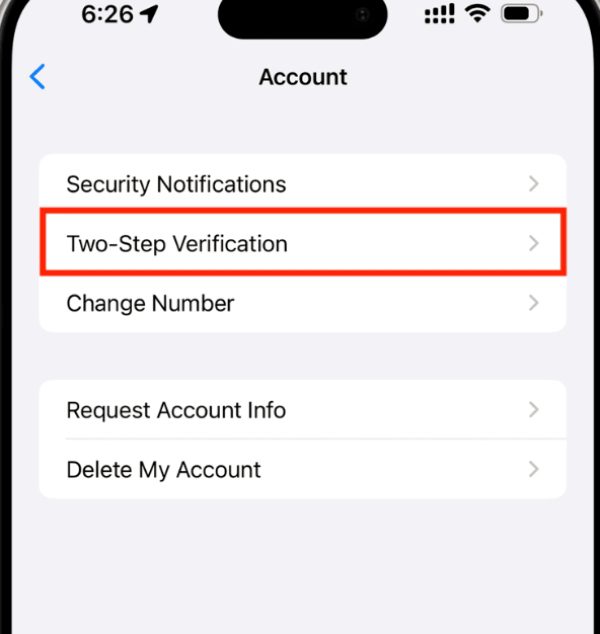


- Set up a strong PIN to avoid future access by unauthorized persons.
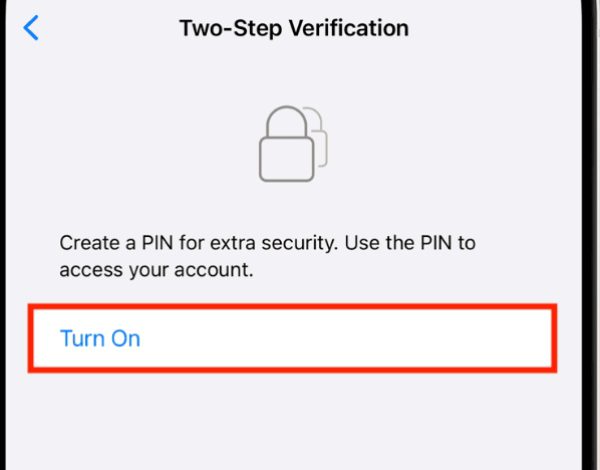


Step 3. Notify Your Contacts
- Inform your friends and relatives about the fact that your account was hacked.
- Instruct them not to click on any links or give any information to “you” until your account is safe.
Step 4. Contact WhatsApp Support
- In case of any issue with login, it is recommended you write an email to support@whatsapp.com
- Use the subject “Lost/Stolen Account” and provide your phone number including the country code.
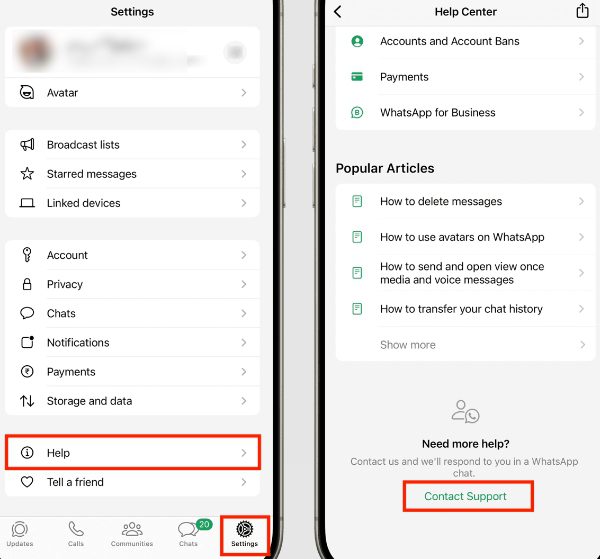


- This email will be a request to deactivate your account for security reasons.
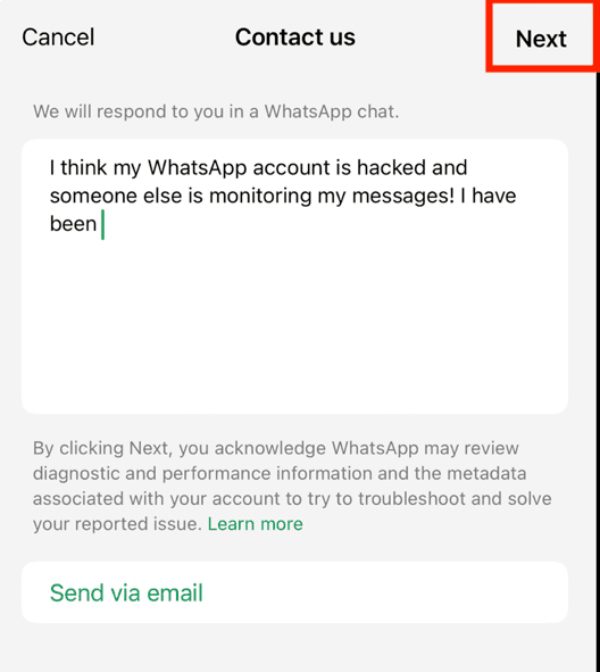


Step 5. A: Malware Scan & Securing Your Device
- Check for spyware or other malicious apps that might have been downloaded on your phone.
- It is recommended to update your operating system and WhatsApp to address security issues.
When you follow these processes, you can easily regain your lost WhatsApp account. As well as ensure that your account does not experience the same issue in the future.
How to log out from hacked WhatsApp?
If you are sure that someone compromised your account and you want to log the hacker out of the application. The following are the steps that you should follow.
Step 1. Open the WhatsApp application on your mobile phone.
Step 2. Tap the three dots in the top right corner and select “Settings.”
Step 3. Select “Linked Devices.” This section shows all connected devices at the moment on your WhatsApp, be it WhatsApp Web, WhatsApp Desktop or any other device.
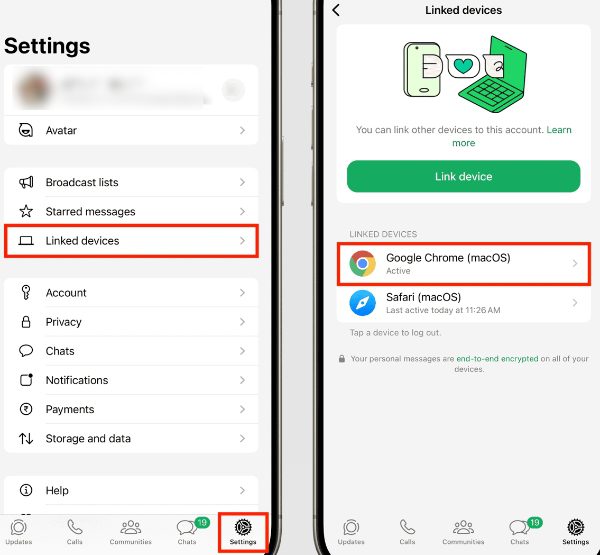


Step 4. Tap on each device listed and then, tap on Log out. You may also choose the option that says “Log out all devices” to log all active sessions out of the system.
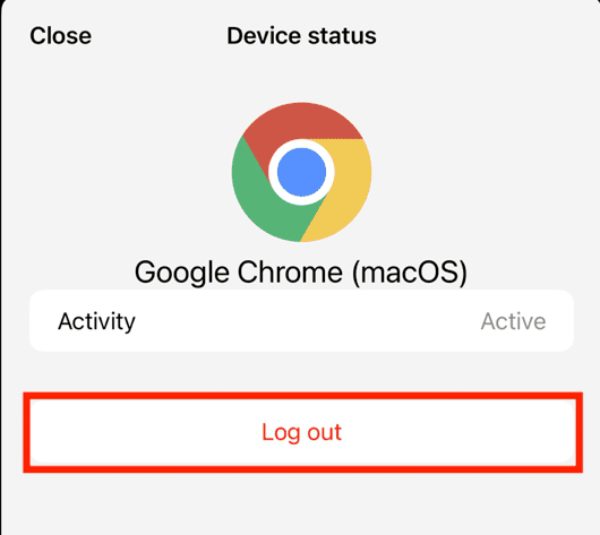


By following these steps, one can reset the hacked WhatsApp and regain control of the account. Besides securing yourself from future aggression.
Practical tips: protect your WhatsApp account from getting hacked?
To prevent your WhatsApp account from hackers, there are certain measures that you need to follow and precautions that you have to take.
- Enable two-step verification. This introduces another level of security whereby even if the hacker gets your verification code, he/she cannot get into your account.
- Never share your verification code. WhatsApp will never ask for your 6-digit verification code. If someone asks for it, it is most probably a con. It is important to keep this code confidential at all times.
- Beware of phishing attempts. Do not click on any links or messages that you doubt to be genuine even if they are from your friends or contacts. This is because hackers employ phishing as a way of obtaining your details.
- Keep WhatsApp updated. Ensure that you are using the latest version of WhatsApp. Whenever new updates are released, they contain fixes for security risks that hackers might have exploited.
- Log out of WhatsApp web. If you are using WhatsApp Web make sure to log out from any computer that is open to other people.
Implementing these actionable tips can help you minimize the chances of being hacked on the WhatsApp platform and keep your private details safe.
Conclusion
The increase in WhatsApp hacked accounts cases, is a clear indication that users need to always be alert. And on the lookout on how they can protect their privacy online.
To minimize the risk of being hacked, one should consider safety measures like two-step verification, avoid phishing scams, and check for linked devices frequently. For parents, there are additional options like FlashGet Kids that provide extra protection in the form of social app monitoring and other app controls to ensure the safety of children.
FAQs
Although WhatsApp has of high level of security implemented using end-to-end encryption, no platforms is fully safe. Phishing, malware, social engineering are some of the ways through which hackers can be able to infiltrate the system.
Such signs will range from receiving weird logout notifications, seeing unfamiliar gadgets in the “Linked Devices” section, or your contacts reporting odd messages from you. Security checks can increase the chances of detecting an intrusion.
You can reach out to WhatsApp support via email at support@whatsapp.com or through Settings > Help > Contact Us from inside the app. Provide your phone number in the international format and the details about the hack.
Yes, your Whatsapp can still be hacked through installation of malware or direct physical access to the device. Some of these attacks do not even go through the verification process as they take advantage of security loopholes or specific spyware.
Yes, if hacker has does harm to your WhatsApp account, then they can have access to your current and previous conversation, media files, contact list and group chats. However, since messages are encrypted end to end, they cannot intercept them while they are being transmitted.

